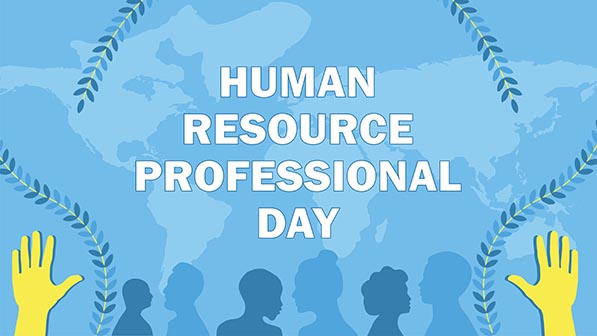Recruiter, psychologist, peacemaker, event planner, employee development, benefit expert, teacher, detective — these are just SOME of the many roles and responsibilities human resource (HR) professionals contribute to their organizations. And on September 26, we celebrate and honor the important and vital contributions HR professionals bring to their organizations. Here are just three of the many diverse responsibilities that HR professionals handle.
Recruiting, Onboarding and Employee Separations
HR professionals have a role in every employment stage — from recruiting for open positions, finding and interviewing applicants, onboarding new hires and handling final pay when an employee leaves your company.
Finding the right job candidates can be difficult, as 90 percent of hiring managers say they have a hard time finding skilled professionals, according to a December 2023 Robert Half survey. Finding candidates who align with company culture and meeting their salary expectations are two of the biggest challenges for hiring. But an HR professionals’ job is just getting started after a job candidate is hired.
The new hire orientation and onboarding is more than just completing forms, it’s the company’s chance to welcome the employee into the workplace and set the tone for their employment. HR professionals should review the employee handbook and key workplace policies as well as answer any questions the employee may have about the company’s policies and practices.
Finally, as new employees are hired, current employees may be moving on from the company. HR professionals have to be knowledgeable about California’s final pay laws, which have very specific timing requirements depending on whether the employee quit without notice or 72-hours’ notice, or was terminated or laid off. Certain deductions, like health insurance premiums, can be made but other deductions have strict limitations.
And that’s not all HR professionals manage.
Making Sure Supervisors Are Properly Trained
Supervisors are often an employee’s first point of contact as well as the company’s eyes and ears. If supervisors are properly trained on many common legal issues — such as meal and rest breaks, off-the-clock work, handling workplace complaints, requests for leaves of absence or medical-related accommodations — the company could be saved from expensive and time-consuming legislation. Supervisors must also understand the importance of applying policies consistently otherwise claims of differential treatment can cause problems.
Often employers focus on the mandatory two-hour supervisor harassment prevention training — that each supervisor must complete within six months of hire or promotion and then every two years thereafter — but don’t forget about training on wage and hour laws. For instance, on Friday, September 27, CalChamber will have a one-hour Supervisor Essentials: Wage and Hour seminar that is tailored specifically for wage and hour issues supervisors regularly encounter.
Plus, the recent Private Attorneys General Act (PAGA) reform measures made training supervisors even more critical. Employers can reduce potential PAGA penalties if they have taken “reasonable steps” to comply with the Labor Code, which can include properly training supervisors on wage and hours issues, like overtime pay, makeup time and paid sick leave.
But supervisor training should go beyond legal compliance. Supervisors also need training in leadership skills — like effective communication, conflict resolution and providing constructive feedback — so they can manage their teams effectively and foster a positive work environment.
HR professionals understand how critical it is to keep supervisors trained.
Knowing About New Laws and Updating Employee Handbooks
While January 1 is usually the busiest time of the year as HR professionals implement new employment laws, those updates can also happen throughout the year. Already in 2024, HR professionals had to deal with a new fast food minimum wage, new local ordinances, updated local ordinance minimum wages, PAGA reform, workplace violence prevention plans, indoor heat illness and more.
These new laws and regulations may also require updates to company’s employee handbook to keep employers in legal compliance. For example, on July 1, 2024, employers needed to add a workplace violence prevention policy that was updated to fit within the new law’s framework, such as incorporating references to your workplace violence prevention plan.
HR professionals know it is always a best practice to keep your policies up to date with California employment laws. CalChamber’s California Employee Handbook Creator online tool helps create an employee handbook that complies with state and federal laws but also helps protect your business and employees — plus makes it easy to revise your employee handbook.
HR professionals help California businesses and organizations run smoothly and maintain legal compliance, and CalChamber hopes to make your difficult job slightly easier with our webinars, seminars, tools and resources. We appreciate HR professionals for all that they do. Happy HR Professionals Day!
Katie Culliton, Editor, CalChamber
CalChamber members can use the Wage and Hour Guide, which contains CalChamber resources related to the most common wage and hour topics that employers must comply with, on HRCalifornia. Not a member? Learn how to power your business with a CalChamber membership.
